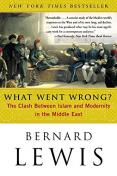BKMT READING GUIDES
What Went Wrong?: The Clash Between Islam and Modernity in the Middle East
by Bernard Lewis
Paperback : 0 pages
2 clubs reading this now
0 members have read this book
For centuries, the world of Islam was in the forefront of human achievement -- the foremost military and economic power in the world, the leader in the arts and sciences of civilization. Christian Europe was seen as an outer darkness of barbarism and unbelief from which there was nothing ...
Introduction
For centuries, the world of Islam was in the forefront of human achievement -- the foremost military and economic power in the world, the leader in the arts and sciences of civilization. Christian Europe was seen as an outer darkness of barbarism and unbelief from which there was nothing to learn or to fear. And then everything changed. The West won victory after victory, first on the battlefield and then in the marketplace.
In this elegantly written volume, Bernard Lewis, a renowned authority an Islamic affairs, examines the anguished reaction of the Islamic world as it tried to make sense of how it had been overtaken, overshadowed, and dominated by the West. In a fascinating portrait of a culture in turmoil, Lewis shows how the Middle East turned its attention to understanding European weaponry, industry, government, education, and culture. He also describes how some Middle Easterners fastened blame on a series of scapegoats, while others asked not "Who did this to us?" but rather "Where did we go wrong?"
With a new Afterword that addresses September 11 and its aftermath, What Went Wrong? is an urgent, accessible book that no one who is concerned with contemporary affairs will want to miss.
Editorial Review
Bernard Lewis is the West's greatest historian and interpreter of the Near East. Books such as The Middle East and The Arabs in History are required reading for anybody who hopes to understand the region and its people. Now Lewis offers What Went Wrong?, a concise and timely survey of how Islamic civilization fell from worldwide leadership in almost every frontier of human knowledge five or six centuries ago to a "poor, weak, and ignorant" backwater that is today dominated by "shabby tyrannies ... modern only in their apparatus of repression and terror." He offers no easy answers, but does provide an engaging chronicle of the Arab encounter with Europe in all its military, economic, and cultural dimensions. The most dramatic reversal, he says, may have occurred in the sciences: "Those who had been disciples now became teachers; those who had been masters became pupils, often reluctant and resentful pupils." Today's Arab governments have blamed their plight on any number of external culprits, from Western imperialism to the Jews. Lewis believes they must instead commit to putting their own houses in order: "If the peoples of Middle East continue on their present path, the suicide bomber may become a metaphor for the whole region, and there will be no escape from a downward spiral of hate and spite, rage and self-pity, [and] poverty and oppression." Anybody who wants to understand the historical backdrop to September 11 would do well to look for it on these pages. --John MillerDiscussion Questions
No discussion questions at this time.Book Club Recommendations
Recommended to book clubs by 0 of 0 members.
Book Club HQ to over 90,000+ book clubs and ready to welcome yours.
Get free weekly updates on top club picks, book giveaways, author events and more








